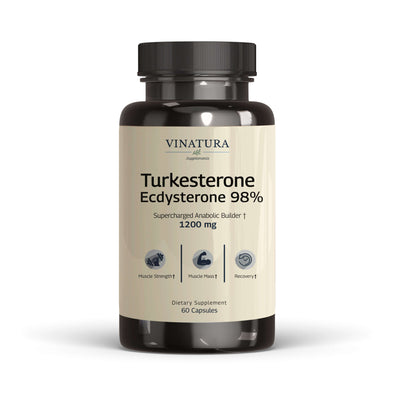
7+ Benefits of Tongkat Ali Coffee: How to Make it Yourself
Tongkat Ali coffee has been gaining popularity over the years as a natural supplement with multiple health benefits.
Not only does it help in boosting energy and focus, but it also aids in improving overall well-being.
This article will discuss benefits of Tongkat Ali coffee for both male and female as well as how to brew this amazing drink yourself!
Before exploring further, please read the disclaimer located at the end of this webpage.
Key Takeaways
- Tongkat Ali coffee is an excellent choice every morning to boost energy, improve athletic performance, mood, especially for male.
- Tongkat Ali coffee helps you overcome the bitter taste and discomfort of Tongkat Ali and also helps limit excessive caffeine consumption.
- You can make Tongkat Ali coffee at home without spending a lot of money to buy ready-made products.
- You can combine Tongkat Ali coffee with milk or honey to increase sweetness for the drink, suitable for active women.
What is Tongkat Ali Coffee?

Tongkat Ali coffee is a type of coffee that is infused with Tongkat Ali extract.
Tongkat Ali's roots are rich in bioactive compounds such as quassinoids, alkaloids, and flavonoids, which contribute to its numerous health benefits, such as enhanced energy and sports performance.
Caffeine, a naturally occurring stimulant primarily present in coffee, tea, and cacao plants, operates by activating the brain and central nervous system.
When infused with Tongkat Ali with coffee, these substances work synergistically to increase energy, enhance focus, and promote general well-being.
Many people also wonder: "Does Tongkat Ali have caffeine?". The answer is no.
The fact that Tongkat Ali does not contain caffeine yet remains highly effective in boosting energy is also a strong point of Tongkat Ali coffee.
For instance, using tongkat ali may reduce the amount of caffeine consumed to boost energy, avoiding potential side effects from caffeine.
Additionally, tongkat ali coffee can be combined with milk or honey to mitigate the bitterness of tongkat ali.
You can enjoy Tongkat Ali coffee by using ready-made products available in the market, or you can also make it at home.
If you're eager to learn the recipe for making tongkat ali coffee yourself, head straight to the 'How to make Tongkat Ali coffee yourself' section.
7+ Benefits of Tongkat Ali Coffee
Enhances Emotional State & Cognitive Abilities

Tongkat Ali coffee is known for its ability to promote an overall positive emotional state. It may help reduce stress, anxiety, and depression by regulating cortisol levels in the body.
Cortisol is a hormone released in response to stress, and prolonged high levels can negatively affect mental health.
Tongkat Ali has been found to help reduce cortisol levels, improving mood, concentration, and cognitive abilities.
A study conducted on 63 subjects showed significant improvements in emotional well-being and cognitive abilities when taking Tongkat Ali extract [1].
Alongside Tongkat ali, caffeine in coffee also works to enhance mood, particularly alertness.
A study has recognized caffeine as a prime example of a substance that improves mental energy, alertness, vigilance, and mood elevation [3].
Improve Your Body's Energy Balances and Weight
The combination of coffee and Tongkat Ali aids in boosting physical endurance and mental stamina, providing a sustained sense of vitality throughout the day.
A study investigating the effects of caffeine on energy balance discovered that it increases energy expenditure (EE) while decreasing energy intake (EI).
This mechanism impacts energy balance and helps maintain a stable body-weight equilibrium [4].
Furthermore, a comprehensive study on the applications of Tongkat Ali (Eurycoma longifolia) in human performance and sports highlights its potential for enhancing energy and aiding in weight loss [5].
Elevates Athletic Performance
Athletes and fitness enthusiasts highly seek Tongkat Ali coffee due to its remarkable ability to enhance sports performance.
This exceptional beverage aids in boosting muscle strength, reducing fatigue and recovery time and promoting overall athletic endurance.
Furthermore, a study on sports training performance [5] highlights that Tongkat Ali is exceptionally effective in improving workout performance while increasing testosterone levels and supporting muscle size and strength, especially when you take Tongkat Ali before a workout.
Switching gears to coffee itself, caffeine is synonymous with performance. Extensive research has delved into the efficacy of caffeine on exercise endurance and physical performance.

Improves Sexual Desire and Performance
The impact of Tongkat Ali on sexual desire and male fertility is widely acknowledged and supported by numerous studies.
Tongkat Ali extract's ability to boost testosterone levels is particularly noteworthy, attributed to its key compounds: eurycomanone and quassinoids [1] [2].
While the research connecting caffeine to testosterone is limited, it is worth noting that some studies have explored this relationship.
One study suggests a correlation between caffeine and testosterone by binding sex hormone-binding globulin (SHBG) in the bloodstream [7].
Improve Sperm Count & Men's Fertility
Numerous studies have indicated that the results of increased testosterone include improvements in sexual desire and sperm counts, not only in animals but also with effective outcomes observed in humans [1] [2].
In contrast, no study demonstrates a direct relationship between caffeine and sperm count.
On the contrary, some adverse studies suggest that excessive caffeine consumption can potentially affect male reproductive capacity [8], [9].
However, it's worth noting that this is when caffeine is consumed in excessive doses, combined with an unhealthy lifestyle such as smoking and excessive alcohol consumption.
Therefore, it can be concluded that Tongkat Ali Coffee may also impact male fertility and, to some extent, sperm count, primarily due to the effects of Tongkat Ali when consumed in the appropriate dosage.
Helps to Boost Your Immune System
Tongkat Ali and coffee possess properties that positively influence the human immune system.
A 2021 study titled "Coffee and its effects on the immune system" credited coffee's immune-boosting effects to several compounds it contains, such as caffeine, chlorogenic acid, kahweol, cafestol, and more [11].
Equally important is the potent effect of Tongkat Ali on the immune system.
This was demonstrated in a double-blind study conducted in Japan, where the group consuming Tongkat Ali exhibited higher SIV and immune scores compared to the non-consuming group.
Reduces The Risk Of Diabetes
A meta-analysis study titled "Coffee and caffeine intake and incidence of type 2 diabetes mellitus" suggests that regular consumption of caffeine-containing coffee can significantly lower the risk of developing Type 2 Diabetes Mellitus (T2DM) [13].
Additionally, a notable study by Chan et al. (2019) has found promising evidence of the anti-diabetic potential of Tongkat Ali in an animal model, particularly concerning its influence on blood glucose levels [15].
Thus, it appears that Tongkat Ali coffee holds promising benefits for reducing the risk of diabetes.
How to Make Tongkat Ali Coffee Yourself: Special Recipe
Making your own Tongkat Ali coffee can be a fun and rewarding process. Here's a special recipe you can try:
Ingredients
- Freshly roasted coffee beans (preferably Arabica or a blend you enjoy) or you can use coffee powder.
- Tongkat Ali powder (ensure it's high quality and sourced from a reputable supplier)
- Warm Water
- Sweetener of your choice such as honey mik ỏ cream (optional)
Instructions
Step 1: Prepare Tongkat Ali Extract:
- In a separate container, mix Tongkat Ali powder with warm water.
- Use about 1 teaspoon of Tongkat Ali powder per cup of coffee.
- Stir well until the powder is completely dissolved.
- Let it sit for a few minutes to allow the Tongkat Ali to infuse into the water.
Step 2: Brewing Coffee
- Brew your coffee using your preferred method. You can use a drip coffee maker, French press, AeroPress, or any other brewing method you prefer.
- Use the Tongkat Ali-infused water as part of the brewing process.
- If you prefer stronger Tongkat Ali flavor, you can brew the coffee directly with the Tongkat Ali extract.
Step 3: Add Sweetener (Optional)
If you like your coffee sweetened, you can add your preferred sweetener to taste.
This could be sugar, honey, maple syrup, or any other sweetener of your choice.
Step 4: Add Milk or Cream (Optional)
If you enjoy creamy coffee, add some milk or cream to your brewed Tongkat Ali coffee.
Step 5: Stir and Enjoy
Once you've added any desired sweeteners or cream, stir your Tongkat Ali coffee well to combine all the flavors.
Is Tongkat Ali Coffee Effective As a Supplement?
Given the various potential benefits of Tongkat Ali coffee discussed above, it is evident that this hybrid beverage holds great potential as a supplement.
To determine whether Coffee Tongkat Ali qualifies as a dietary supplement depends on the product's composition.
In many cases, Coffee Tongkat Ali primarily contains coffee with very little Tongkat Ali. This results in minimal benefits from the Tongkat Ali when users consume Coffee Tongkat Ali.
Authenticity and quality of ingredients are key factors in determining the efficacy of any supplement.
Some Tongkat Ali products from less reputable manufacturers may contain impurities, which can even be harmful to health, especially if Tongkat Ali is contaminated with mercury.
Read more: Looking For A Tongkat Ali Without Mercury? Detail Guide
Additionally, if you're using ground coffee to make Tongkat Ali coffee at home, it's important to choose pure coffee grounds.
Many products mix various powders similar to coffee to deceive consumers. One manual way to identify quality coffee is through the aroma and texture of the powder.
Who Should Choose Coffee Tongkat Ali?
Coffee Tongkat Ali is a natural supplement that offers numerous health benefits, making it appealing to a wide range of individuals.
However, there are certain groups of people who can particularly benefit from this product. So, who should choose Coffee Tongkat Ali?
Athletes and Active Individuals
One major group of people who can greatly benefit from Coffee Tongkat Ali are athletes and active individuals.
This is because Tongkat Ali has been shown to increase testosterone levels, which can improve athletic performance and muscle mass.
Additionally, Tongkat Ali Coffee can also help with recovery after intense workouts, making it an ideal supplement for those who engage in regular physical activity.
Men with Low Testosterone Levels
As mentioned earlier, Coffee Tongkat Ali has been shown to increase testosterone levels, making it a great option for men with low testosterone levels.
Low testosterone can lead to numerous health issues, such as decreased libido, fatigue, and mood swings.
By incorporating Coffee Tongkat Ali into their routine, men may see an improvement in these symptoms and an overall increase in energy and vitality.
Individuals Looking to Boost Overall Health
Even if you don't fall into any of the previously mentioned categories, Coffee Tongkat Ali can still be a beneficial supplement for your overall health.
It has antioxidant properties that can help protect against cell damage and improve immune function.
Additionally, it may also support cognitive function and reduce stress levels.
Conclusion
In conclusion, Coffee Tongkat Ali is a unique and promising product that combines the benefits of coffee and Tongkat Ali into one potent supplement.
With its potential to boost testosterone levels, improve sports recovery, reduce fatigue, and potentially reduce the risk of diabetes, this hybrid beverage has gained popularity among athletes and health enthusiasts alike.
However, it is essential to carefully consider the composition and quality of the product to take full advantage of the benefits of Tongkat Ali coffee.
References
- [1] Shaheed Ur Rehman, Kevin Kyungsik Choe, & Hye Hyun Yoo. (2016). Review on a Traditional Herbal Medicine, Eurycoma longifolia Jack (Tongkat Ali): Its Traditional Uses, Chemistry, Evidence-Based Pharmacology and Toxicology. Molecules, 21(3), 331–331. https://doi.org/10.3390/molecules21030331
- [2] Talbott, S. (2013). Human Performance and Sports Applications of Tongkat Ali (Eurycoma longifolia). Elsevier EBooks. https://doi.org/10.1016/b978-0-12-396454-0.00053-9
- [3] Lieberman, H. R. (2009). The Effects of Ginseng, Ephedrine, and Caffeine on Cognitive Performance, Mood and Energy. Nutrition Reviews, 59(4), 91–102. https://doi.org/10.1111/j.1753-4887.2001.tb06995.x
- [4] Eynav Harpaz, Tamir, S., Weinstein, A., & Weinstein, Y. (2016). The effect of caffeine on energy balance. Journal of Basic and Clinical Physiology and Pharmacology, 28(1), 1–10. https://doi.org/10.1515/jbcpp-2016-0090
- [5] Talbott, S. (2013). Human Performance and Sports Applications of Tongkat Ali (Eurycoma longifolia). Elsevier EBooks. https://doi.org/10.1016/b978-0-12-396454-0.00053-9
- [6] Bülent Sökmen, Armstrong, L. E., Kraemer, W. J., Casa, D. J., Teixeira, C., Judelson, D. A., & Maresh, C. M. (2008). Caffeine Use in Sports: Considerations for the Athlete. Journal of Strength and Conditioning Research, 22(3), 978–986. https://doi.org/10.1519/jsc.0b013e3181660cec
- [7] Corona, G., Giorda, C., Cucinotta, D., Guida, P., & Nada, E. (2014). Sexual Dysfunction at the Onset of Type 2 Diabetes: The Interplay of Depression, Hormonal and Cardiovascular Factors. The Journal of Sexual Medicine, 11(8), 2065–2073. https://doi.org/10.1111/jsm.12601
- [8] Tina Kold Jensen, Swan, S. H., Skakkebæk, N. E., Rasmussen, S., & Niels Jørgensen. (2010). Caffeine Intake and Semen Quality in a Population of 2,554 Young Danish Men. American Journal of Epidemiology, 171(8), 883–891. https://doi.org/10.1093/aje/kwq007
- [9] Ricci, E., Viganò, P., Cipriani, S., Somigliana, E., Francesça Chiaffarino, A Bulfoni, & Fabio Parazzini. (2017). Coffee and caffeine intake and male infertility: a systematic review. Nutrition Journal, 16(1). https://doi.org/10.1186/s12937-017-0257-2
- [10] Büşra Açıkalın, & Nevin Şanlıer. (2021). Coffee and its effects on the immune system. Trends in Food Science and Technology, 114, 625–632. https://doi.org/10.1016/j.tifs.2021.06.023
- [11] Talbott, S., Talbott, J. A., George, A., & Pugh, M. (2013). Effect of Tongkat Ali on stress hormones and psychological mood state in moderately stressed subjects. Journal of the International Society of Sports Nutrition, 10(1). https://doi.org/10.1186/1550-2783-10-28
- [12] Raci Karayiğit, Forbes, S. C., Zakir Osmanov, Canan Yılmaz, Burak Çağlar Yaşli, Naderi, A., Hakan Büyükçelebi, Benešová, D., Tomasz Gabryś, & Ozcan Esen. (2022). Low and Moderate Doses of Caffeinated Coffee Improve Repeated Sprint Performance in Female Team Sport Athletes. Biology, 11(10), 1498–1498. https://doi.org/10.3390/biology11101498
- [13] McCarty, M. F. (2005). A chlorogenic acid-induced increase in GLP-1 production may mediate the impact of heavy coffee consumption on diabetes risk. Medical Hypotheses, 64(4), 848–853. https://doi.org/10.1016/j.mehy.2004.03.037
- [14] Pei Jean Lim, Gan, C.-S., Khong, T. K., Sareena Hanim Hamzah, & Ashril Yusof. (2017). Effect of Eurycoma Longifolia Jack Extract on Lipolysis in Collegiate Athletes: Pilot study. IFMBE Proceedings, 97–100. https://doi.org/10.1007/978-981-10-3737-5_20
Author

Product Disclaimer
Including an ingredient or study does not evaluate, endorse, or recommend any Vinatura product or any third-party product. Some ingredients discussed may not be used in any Vinatura product.
The content of the articles has not been evaluated by the Food and Drug Administration (FDA) and is not intended to promote or endorse any specific product. Any products sold on this website are not intended to diagnose, treat, cure, or prevent any disease.
Opinions and Endorsements
Any claims, statements, or opinions expressed in the articles are those of the author(s) and do not necessarily reflect the views or opinions of the manufacturers of the dietary supplement products. The products sold on this website are separate from the content of the articles and are not directly endorsed or associated with the information presented here.
Liability Disclaimer
The author(s) of the articles, website, and manufacturers of the dietary supplement products do not assume any liability for any potential consequences arising from the use of the information provided in the articles. Ingredient effects, dosages, and safety vary by individual, formulation, and context; some ingredients interact with medications or may be unsuitable during pregnancy or lactation. It is recommended that individuals consult with a qualified healthcare professional before making any dietary or lifestyle changes, including the use of dietary supplements.
Product Usage
Please refer to the product labels and packaging for specific usage instructions and guidelines for the dietary supplement products sold on this website.
Customer Support
For any concerns or questions regarding the dietary supplement products, please contact our customer support team, who will be more than happy to assist you.







Leave a Comment
Be the first to comment.
What do you think?